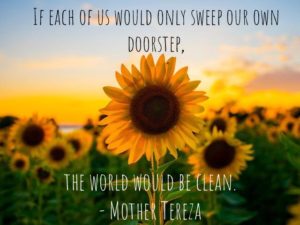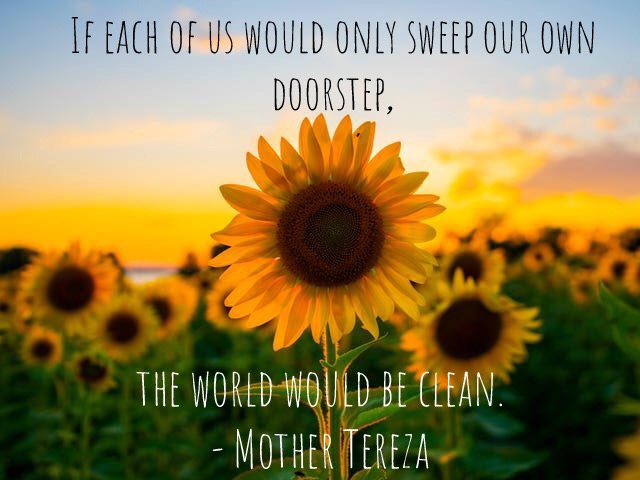A main lesson that is streaming globally for us, on many fronts, is one that has the following outline:
- Look at the data
- Don’t worry, panic or feel anxiety about the data
- Don’t be a douchebag by using (2) as an avoidance strategy to choosing right action
When applied to the Coronavirus, we can step through this lesson in the following way:
- The data: The main symptom of this virus is a cough and fever. A runny nose is NOT a symptom of this virus. Fatigue is a symptom. In fact, 81% of those who carry this virus have unremarkable symptoms that can be as subtle as simply feeling fatigue. The problem with this virus is that, according to data from the China outbreak, it kills 15 out of 100 of those over 80. As is explained on this fantastic website: The total mortality of an epidemic can be high even if the symptoms for the vast majority are mild. While it might not seem intuitive, it is possible for the following two things to be true at the same time:
- For the majority of people, symptoms are mild and in some cases similar to the common flu.
- An epidemic of the same disease can cause a very high number of deaths.
- Don’t worry, panic or feel anxiety about the data: Why? Because all of these things weaken our immune system and keep us up at night (which also weakens our immune system). ..take some advice from the Hitchiker’s guide to the galaxy and “DON’T PANIC!” (caps lock intended to instill fear. KIDDING! Fear is also on the list of “don’t actively seek and cultivate”). So what can we do? We can distance ourselves enough from the data to stay in our thinking mind by engaging curiosity, questioning the data and focusing our attention on more happy thoughts…as long as we don’t fall into the trap of using this focus on happy-making things to avoid right action; which leads me to….
- Don’t be a douchebag. Don’t do it. I might question the data out of China by asking: Huh…I wonder if maybe 15 out of 100 cigarette-smoking men over 80 die, which is a belief that serves me because I know someone over 80 who has the Coronavirus and who I would really like to live; so I’m all in favor of increasing the odds for this non-smoking and otherwise healthy body and will choose to put my focus and attention on the fact that the odds are that this beloved person will be miserable for a bit but will survive just fine. Go body, go! That said, I also don’t want to be personally responsible for spreading a virus that might kill 15 out of 100 people over 80 and who I might somehow be responsible for transmitting it to simply because I’m a single mom who is prone to feeling fatigue and who might conflate the symptoms of COVID-19 with the symptoms that correspond to my personal circumstance. To prevent me from being a douchebag and accidentally infecting others who might experience a much greater harm than I am or will, I am taking social distancing very seriously in my household. I have moved my office home. I have restructured my home to support the shared needs of my son, and I’m instilling new habits for my son and I to live in a way that is enjoyable and fulfilling while also reducing our potential negative impacts on others.

One of the strategies that I’ve found really effective for being able to walk the line of looking at data without feeling overwhelmed by fear and anxiety is to engage a practice of meditation. My personal preference is qigong. I study and learn under the guidance of Brodie Welch (who is also engaging social distancing and available for online coaching sessions right now) and the Ling Gui International Healing Qigong School. I am also a certified teacher but my training goals have largely been to support self-mastery and healing. A note of caution on this front: If you’re really committed to worrying and to feeling anxiety then I don’t recommend qigong or meditation. These practices might interfere with your worry, anxiety and fear impulses. They might also interfere with habits around giving attention demanding people and circumstances your attention simply because they are attention demanding and you have no other recourse; so, if you want others to be in control of where you put your attention then steer very clear of meditation and qigong. If, on the other hand, you want to put your time and attention toward behaviors that align with right action and not being a douchebag by empowering you with an ability to look at data, to manage the fear and anxiety impulse and to choose an appropriate response for you…then you may want to consider embedding a meditation practice of some sort in your life.
Whatever you choose to do in the coming weeks is your business and not for any of us to judge. You may not have the luxury of being able to work from home, in which case you may be limited to applying the “don’t be a douchebag” principle to engaging in regular hand washing and greeting people with a big, warm smile instead of a close embrace or hand shake. This virus is simple calling us to this main lesson and giving us an opportunity to develop skill building and habits that can shift our cultural identity toward prioritizing a collective, future good. We don’t have to respond to this calling. If we do, however, we may find ourselves empowered in a way that can help us overcome a great many challenges in our lives, including our ability to face and address human-induced global warming.
Do I think we are capable of rising to the occasion? Yes. I do.
Copyright (2020) by Rachael D. Mueller according Creative Commons Attribution-NonCommercial-ShareAlike 4.0 International
https://creativecommons.org/licenses/by-nc-sa/4.0/legalcode
